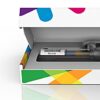The FDA has identified 10 drugs — that treat everything from obesity to arthritis –- that have possible safety issues based on reports of adverse events. The list details potential signals of serious risk or new safety information collected by the agency’s Adverse Event Reporting System (FAERS) in the fourth quarter of 2016. The weight loss drug Contrave, a combination of naltrexone and bupropion, was flagged because the FDA received reports that some patients were losing consciousness. Additionally, the agency discovered a possible signal of diarrhea, vomiting, and nausea with the arthritis drug Otezla (apremilast). The FDA notes that a drug’s appearance on a watch list doesn’t mean the agency has declared a causal relationship with the cited adverse event. Posted April 13, 2017. Via FDA.
The FDA has alerted consumers of a voluntary recall of 13 lots of Mylan’s EpiPen and EpiPen Jr used for emergency treatment of severe allergic reactions. These EpiPen products may contain a defective part that may not activate, preventing the medication from being delivered. Mylan came under fire last year and was slapped with a lawsuit that claims the company was involved in an illegal scheme to dramatically increase the list price of its EpiPen products over the past decade. Posted March 31, 2017. Via FDA.
The FDA has approved more drugs, typically 2 to 3 months faster than European regulators did in recent years. Researchers, reporting in the New England Journal of Medicine, analyzed how new drugs fared before the FDA and the European Medicines Agency between 2011 and 2015, and discovered that the FDA approved more drugs than the Europeans — 170 versus 144 — with a median review time of 306 days versus 383 days in Europe. Posted April 5, 2017. Via NEJM.






